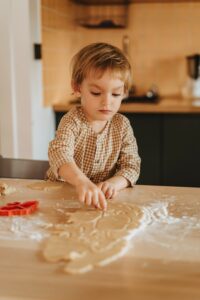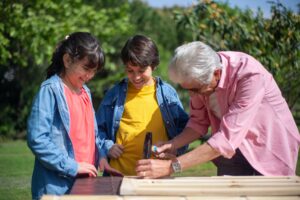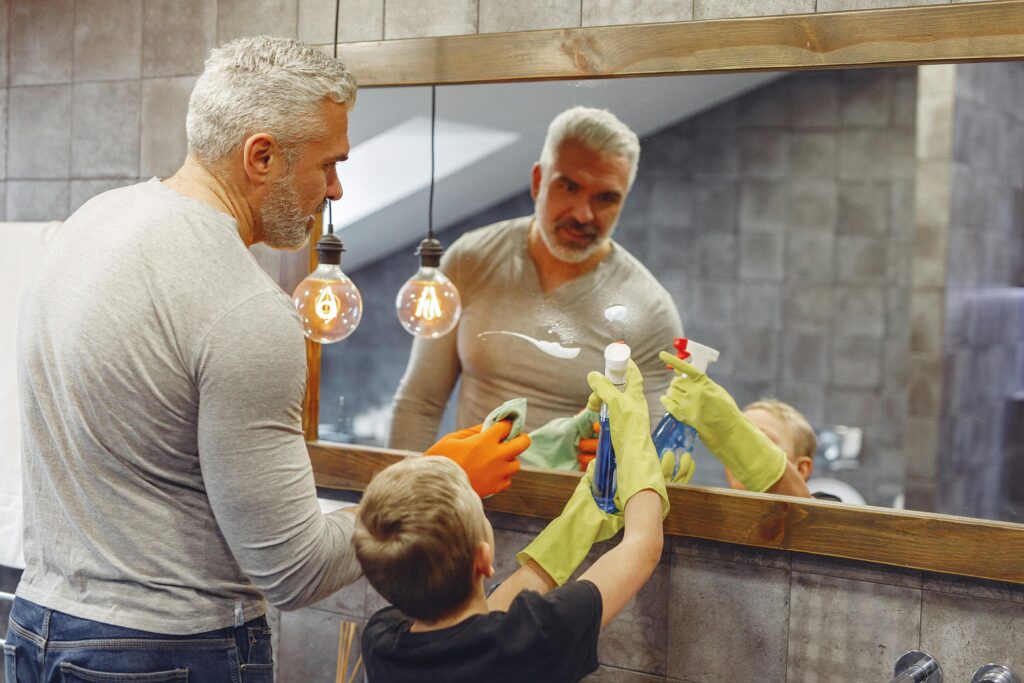Nowadays, teaching children the age-appropriate chores is essential. Beyond simply tidying up the house, these tasks impart valuable life skills and cultivate responsibility and independence in young minds. From baking and woodworking to folding clothes and house cleaning, there is a range of chores that are tailored to their age and abilities.
Giving young kids chores is like planting seeds in a garden of character, nurturing their growth, and watching them bloom into responsible, capable individuals. It’s a crucial part of their development, much like sunshine and water are to flowers. These seemingly mundane tasks might appear insignificant but they connect children to the rhythms of daily life, providing a window into the responsibilities of adulthood. They discover the beauty and comfort of a well-kept home, develop time management skills, and understand that a tidy environment brings a sense of calm and order.
There are benefits in introducing young kids to the concept of cause and effect — spilled milk teaches that actions have consequences. Keeping the playroom neat and organized allows them more space to play around. And dirty dishes from meals don’t get cleaned by magic. These tangible experiences lay the foundation for problem-solving skills, fostering critical thinking.
Early empowerment builds self-esteem, fostering a sense of pride in their contributions, as their small hands begin to shape the world around them. Let’s allow them to discover the value of shared goals, interdependence, and the joy of achieving together.
Any age-specific chores provide a lifelong journey of gaining skills, promoting a strong work ethic and a sense of autonomy.. By sharing the joys and challenges of these everyday activities, we aim to equip parents and guardians with the knowledge and inspiration they need to get their children on a path toward a brighter, more responsible, and independent future.
Age-Appropriate Chores for Young Children
Establishing the foundation of responsibility begins at an early age. Even toddlers can understand the importance of contributing to the family. While they may not be ready for complex tasks, there are age-appropriate chores that can instill the first seeds of responsibility:
Setting the Table: As a parent, you may invite your children to participate in the meal preparation by helping set the table. This simple task not only teaches them about organization and routine but also fosters a sense of belonging. Setting the table requires thought and organization. Children must identify the different utensils, dishes, and glassware needed for the meal. This process encourages them to think systematically and plan ahead as they prepare the table for the family. Through this, kids may also learn the concept of “a place for everything and everything in its right place.” By regularly helping to set the table, children begin to understand the structure of meals and the order of events that take place around the table.
 Dusting and Wiping Surfaces: By engaging them in cleaning, children begin to develop a sense of respect for surroundings. Children learn that keeping their surroundings clean is not only beneficial but is also a responsible and respectful act. Dusting and wiping surfaces give children a sense of ownership over their living space. They begin to understand that the environment is a shared responsibility and that their actions help maintain its cleanliness. This instills a sense of responsibility, which is the foundation of personal development.
Dusting and Wiping Surfaces: By engaging them in cleaning, children begin to develop a sense of respect for surroundings. Children learn that keeping their surroundings clean is not only beneficial but is also a responsible and respectful act. Dusting and wiping surfaces give children a sense of ownership over their living space. They begin to understand that the environment is a shared responsibility and that their actions help maintain its cleanliness. This instills a sense of responsibility, which is the foundation of personal development.


Cookie Baking: In baking cookies, you introduce them to both measurement and precision. Baking is both a science and an art, and it requires careful attention to detail. From measuring ingredients like flour, sugar, and baking powder to ensuring the right temperature and cooking time, children learn that accuracy is important in the kitchen.
Baking requires following a strict recipe. Children learn the importance of step-by-step instructions and they will understand that everything has an order and that skipping steps or changing quantities can lead to different results. This concept of following a defined process instills discipline, patience, and a respect for instructions. This lesson goes beyond baking, helping children develop mathematical and problem-solving skills useful in everyday life.
Homemade Pizzas: For a more interactive experience, letting your kids make their own pizza is a good idea. Making homemade pizza with your kids takes baking to a new level of creativity and self-expression. From kneading the pizza dough to choosing toppings, kids are in control of their culinary creations. This process encourages them to make choices, experiment, and express their personal preferences. It’s an opportunity for them to develop their taste and explore their creative side.
Pizza crust kneading, sauce spreading, and topping arrangement are all tactile exercises that improve a child’s fine motor abilities. Making something from scratch and directly handling the ingredients encourage dexterity, coordination, and sensory awareness.
While enjoying the fun of creating their own pizzas, kids can also learn about nutrition and healthy eating habits. Discussing the nutritional value of different ingredients and the importance of a balanced diet during the pizza-making process can promote an ongoing understanding of the need for healthy food choices.
 Woodworking: Woodworking isn’t just for adults; it can be a fun way to instill creativity and craftsmanship in children. With the right guidance, appropriate tools, and safety measures in place, kids can learn woodworking as they nurture essential life skills and personal development.
Woodworking: Woodworking isn’t just for adults; it can be a fun way to instill creativity and craftsmanship in children. With the right guidance, appropriate tools, and safety measures in place, kids can learn woodworking as they nurture essential life skills and personal development.
Woodworking introduces children to different kind of tools, teaching them how to use basic tools safely and responsibly. Kids learn the value of accuracy, control, and respect for their tools as they work with tools like hammers, saws, and screwdrivers to create their works.
Woodworking provides an opportunity to learn construction and design. As children work with wood, they gain an understanding of how structures come together. They learn to measure, cut, and assemble pieces, applying geometry and mathematics in a hands-on context.
Completing a woodworking project gives fulfillment to the children. They understand the sense of ownership that comes with creating something from scratch. This boosts their self-esteem and self-confidence, reinforcing the idea that they can achieve significant tasks through patience and effort.
 Folding Their Own Clothes: Teaching kids how to fold their clothes is like giving them a key to independence. It empowers them to take responsibility for their belongings and personal space. This sense of accountability goes beyond just doing the duty; it also motivates them to keep up a home that symbolizes their increasing independence. As parents, we know how it feels to walk into a room that’s clean and organized. This sense of order isn’t just about aesthetics; it’s about creating a harmonious environment in which everyone can thrive.
Folding Their Own Clothes: Teaching kids how to fold their clothes is like giving them a key to independence. It empowers them to take responsibility for their belongings and personal space. This sense of accountability goes beyond just doing the duty; it also motivates them to keep up a home that symbolizes their increasing independence. As parents, we know how it feels to walk into a room that’s clean and organized. This sense of order isn’t just about aesthetics; it’s about creating a harmonious environment in which everyone can thrive.
Folding clothes isn’t just about keeping a room neat; it’s about understanding that our living spaces are a reflection of our inner selves. By teaching kids to fold their clothes, we’re teaching them how to create and maintain an environment where they feel comfortable and inspired. This is a valuable lesson that can positively impact their approach to personal space throughout their lives.
Toy Cleanup: Children love to play and explore, but their limitless creativity often leads to toy-related chaos. An organized cleaning routine instills the importance of order, teaching kids that every adventure begins with a clean slate.
Giving children the task of cleaning up their toys will give them a sense of responsibility and accountability. This sends the message that their actions have consequences, and in this case, the consequence is a tidy and easy-to-navigate living space.
Encouraging children to clean up their toys regularly will promote cooperation and teamwork. It becomes a shared family responsibility rather than a chore imposed by adults. This collective effort not only strengthens family bonds but also teaches children that cooperation can turn a difficult task into a fun group activity.
 Washing Dishes: When it comes to teaching kids important life skills, the kitchen is a fantastic classroom. One skill that often gets overlooked but is incredibly valuable is dishwashing. Introducing dishwashing as a regular chore helps kids learn responsibility. They understand that they play a role in maintaining the household.
Washing Dishes: When it comes to teaching kids important life skills, the kitchen is a fantastic classroom. One skill that often gets overlooked but is incredibly valuable is dishwashing. Introducing dishwashing as a regular chore helps kids learn responsibility. They understand that they play a role in maintaining the household.
Washing dishes together encourages teamwork. It’s a great way for siblings or family members to bond and work harmoniously. Kids engage their senses while washing dishes, which is beneficial for sensory development. They experience the tactile feel of water, the smell of soap, and the sight of cleanliness.
Engaging children in age-appropriate chores is a rewarding journey that not only lightens the household load but also instills a sense of responsibility, independence, and essential life skills. The key is to start small, be patient, and make chores a positive and educational experience. As children develop these life skills, they’ll be better prepared to navigate the challenges of the real world with confidence and competence.
